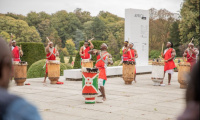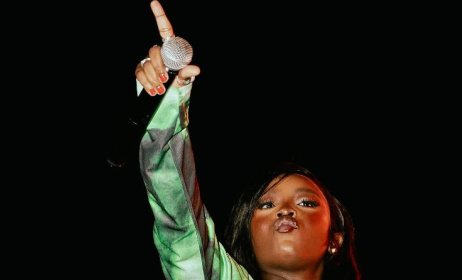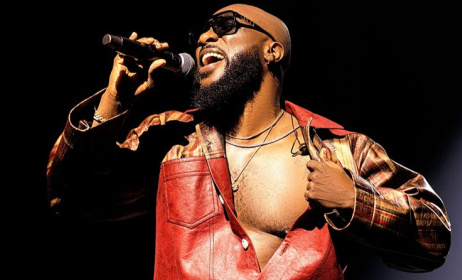Jonilar talks Omziki Ghana’s vision, digital takeover and events
For more than a decade, Jonathan “Jonilar” Nii Laryea has established himself as the expert voice in matters music promotion, education and digital marketing in Ghana.
 Digital music expert Jonathan ‘Jonilar’ Nii Laryea.
Digital music expert Jonathan ‘Jonilar’ Nii Laryea.
Jonilar, who recently took up the role of Ghana country director and brand ambassador for Uganda-based aggregator Omziki, is also regularly lauded for his role in shaping the streaming culture in Ghana, advocating for an indigenous streaming agenda through his work on radio, TV and engagements like the MTN Ghana Digital Music Conference.
He has also provided branding and marketing support to a number of local musicians, including Gallaxy, Keeny Ice, Fuse ODG, Edem, Vanilla Karr, LXG, and R2Bees, among others.
Jonilar recently spoke to Music In Africa about his career and interests, leading Omziki’s operations in Ghana, as well as his longstanding vision of promoting cultural exchange and conservation through rural events.
MUSIC IN AFRICA: First of all, congratulations on your new appointment with Omziki. What does your role at the company specifically entail, and how do you hope its arrival in Ghana will progress digital music distribution in the country?
JONILAR: My role at Omziki is a game-changer for the industry. I have already turned in all the key intervention strategies that will help impact the Ghanaian music industry by way of helping artists get their music in store and properly manage their statistics. Omziki as a platform cares about the continent hence some of the beautiful initiatives like the local payment methods and partnerships at all levels to increase growth.
What drew you to the digital music space and what are your overall impressions about the Ghana situation?
My love for music and the creative arts industry is the drive. I’m passionate about seeing the creative industry in Ghana and Africa at large grow to the level where everybody in the value chain can make ends meet. We have successfully influenced the streaming culture and now Ghanaian musicians can boost streams, which is good for their business dealings.
Who are the biggest winners and losers of the digital takeover?
The biggest winners in the ecosystem are the artists and those who own intellectual property. As it stands now, these largely exist at management level. Inasmuch as they’re playing a pivotal role in the life of these artists, I still feel like they’re left behind and that is why we have to constantly remind the industry about the need to expand the conversation for the benefit of everybody.
What are some specific challenges you have observed about Ghana’s digital music landscape and how do you hope they can be fixed?
Selling masters to major labels for ‘juicy’ packages should not only be the way forward for an artist who’s seeking funding for their music. In Ghana, very successful musicians have their catalogues in the hands of other parties. Of course, it’s standard industry practice, but not for a Ghanaian artist who hasn’t made 500 000 million streams across the board yet. Their future needs protection.
What are some opportunities that exist in the space and how can local independent artists better harness them?
Firstly, a national agenda is crucial to streamline industries, ensure data availability and harness the potential of technology. Through strategic planning and collaboration with industry professionals, academic institutions and tech experts, a national policy can be shaped to promote innovation, protect data privacy and maximise this advantage. This is necessary to design and implement a comprehensive policy. This involves establishing standardised data collection methods, robust infrastructure and transparent data sharing. Prioritising the development of artificial intelligence (AI) technology will also enhance productivity and efficiency with solutions for data analysis, automation, customer insights and personalised marketing.
Secondly, Ghana’s streaming culture is growing. However, we also have to strategically deal with the challenges it comes with. Currently, we don’t have data on media, airplay and mechanical use of people’s works, making it difficult to actually make a business proposition.
At Jonilar.net, we have, in our own small way, started rolling out a series of initiatives to correct the knowledge deficit in the space. These include, but are not limited to, a podcast series and our flagship digital music education seminar to all 16 regions across the nation.
Beyond your efforts in the digital music space, you are also keen on fostering cultural exchange and preservation through rural events such as the River Jamboree and the Street Jamboree. Can you offer more insight into these initiatives?
The River Jamboree, organised by Champs Hub every December, showcases the natural beauty of Ghana’s rivers while advocating for their protection. This event is held at Volo, a two-hour drive from Accra, to allow city dwellers to experience December in the village. Volo is a hidden gem for talent scouting and offers breathtaking scenery, making it an ideal location for the River Jamboree. Additionally, the event advocates for water conservation and against sand mining, aligning with the UN’s Sustainable Development Goals.
The Street Jamboree, which happened on 1 July in Juapong, Volta Region, aims to take comprehensive and thought-provoking events to rural areas. These projects have received immense support from Samuel Okudzeto Ablakwa, Ghana’s member of parliament for North Tongu, who has played a major role in ensuring the success of these events.
How do these rural events contribute to fostering cultural exchange, and what role do they play in preserving traditional music and art forms?
As cultural creators, we prioritise the narratives we convey through the arts during our events. Previous editions have showcased a grand display of traditional music, dance, and more.
In what ways do you ensure that the events remain inclusive and representative of the diverse cultural heritage of Ghana?
Our planning process involves meticulous research and the collaboration of experienced event architects who excel at creating unforgettable experiences. We recognise the challenge within Ghana’s showbiz space where lack of research can lead to stagnant events that fail to captivate audiences.
What are your future plans or aspirations for expanding the reach and impact of cultural exchange initiatives like the River Jamboree and the Street Jamboree?
We are currently engaging in discussions with various agencies, including the presidency, to incorporate these events into the national calendar. This approach allows us to thoughtfully involve both Ghanaians and expatriates in the festivities.
How do you envision the intersection of the digital music space and your cultural exchange efforts in the future?
The advent of digital media has greatly benefited our event culture and these events harness the power of the digital music space to extend their reach and connect with audiences worldwide.



























Comments
Log in or register to post comments